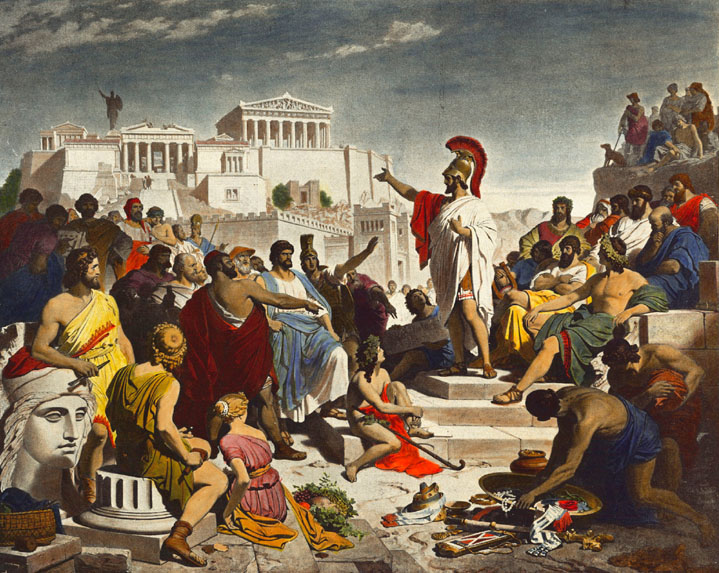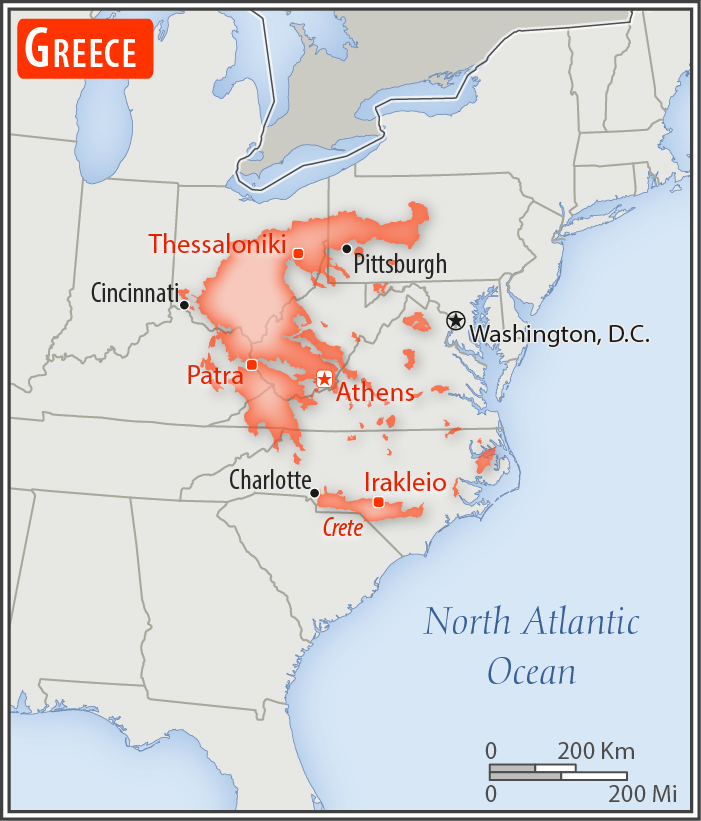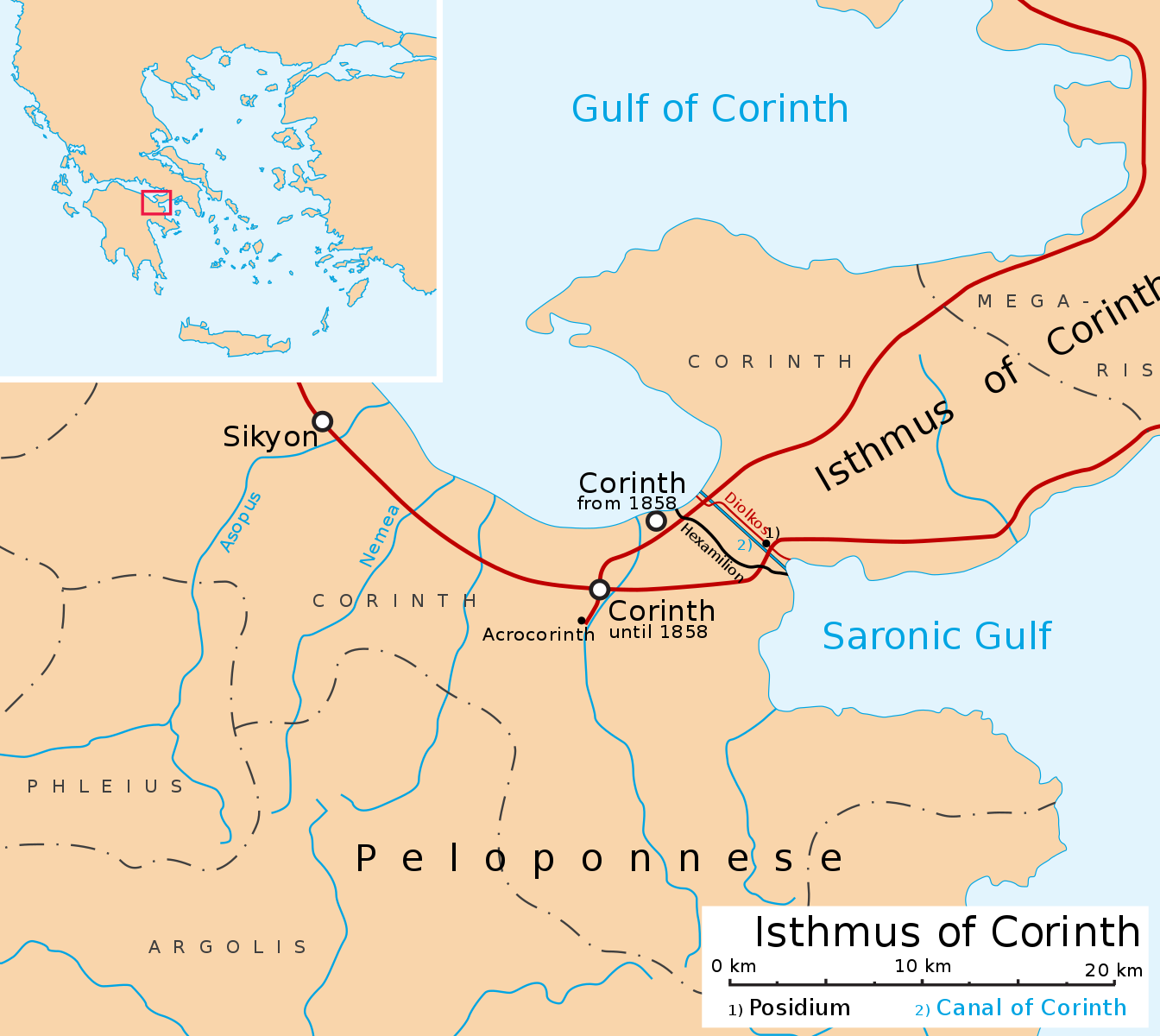

It’s important to grasp Thucydides’s realism in The War of the Peloponnesians and the Athenians (late 5th century BC). He shows the ways of the world, aspects of events nobody can control, and real motives behind expressed ones. Sometimes, however, Thucydides spies trends that can be managed or which signal an advantage to one side. He demonstrates too that history is not only a series of great actors or battles but also one of conflicts between cultural abstractions many generations in the making.
The obvious reason Americans should read Thucydides is that the Founders scoured him for clues about how to proceed in the volatile context of the early Republic. The traditional excuses for reading a great book apply. Eighteenth-century thinkers sensed ancient Greek literature’s wisdom concerning timeless but tricky concepts like fear, courage, war, treachery, history, tragedy, nation, tyranny, empire, treaty, constitution, and politics. Thucydides remains the most important historian because he documented one of the seminal events in the history of Western Civilization, the war between the Peloponnesian League centered on Sparta and the Delian League led by Athens. He brings his own credentials too. He ventures compelling theories about the causes of the war in question; and he demonstrates attention to detail, convincing methods, and respect for controversy. On par with Odysseus, he exemplifies the astonishing degree of abstract and creative thinking of ancient Greeks.
The period covered by Thucydides also interested the American Founders. His portrayals of commerce and forms of democracy among a group of rivalrous city-states about the size of the thirteen American colonies confirmed the public utility of two liberal bourgeois priorities that had recently come to light: the vitality of self-governance and the proper conditions for wealth creation. At the same time, however, he signaled the threat of a slippery slope to war. The Constitution’s provisions for divided government, free commerce, the rule of law, and public finance echo these concerns. So does all the agonizing over domestic schism or foreign invasion in the early essays of The Federalist Papers (1787–88).
I think what makes Thucydides so powerful is his ancient status. We’re surprised to find that a complex set of insights from twenty-five centuries ago still makes sense. This implies that he offers privileged access to great truths. Again, it’s easy to see why the Founders read him.
Nevertheless, because we usually read history in search of dates, locations, and protagonists, Thucydides’s deepest lessons can slip by like brief glimpses below the frozen surface of events. Remarking on social traditions or governing structures, he often notes asymmetries between rival groups that drive the history he is telling. This hints at a theory about human civilization, one we might expect from an historian. Randomness and unimagined outcomes in war and geopolitics can obscure greater tidal or tectonic forces in both domestic and international relations.
Thucydides announces at the outset that the Peloponnesian War is a binary implosion of the Greek world: “both sides came into the war at the height of their powers and in a full state of military readiness, … most of the Greek world had either taken sides right at the start or was now planning to do so” (1.1.1). As when we read about Socrates or Christ, the weight of knowing what’s coming adds to the reader’s anxiety as chances to escape it are foreclosed by paradox. For instance, Thucydides notes that the same public agility that helps a city-state avoid costly adventurism also runs the risk of inviting attack if it appears unwilling to respond to threats: “A peace that is born of war is much the stronger, while avoiding war to preserve one’s peace and quiet is fraught with danger” (1.124.2). This implies permanent tension. Everyone is locked into bristling vigilance; nobody can opt out, most must pick sides, like it or not, and their decisions often don’t matter once events are under way.
This polarity between Athens and Sparta which nobody can stop carries the weight of an eternal warning. Like large names in the map game in Edgar Allan Poe’s “The Purloined Letter,” the reason the Founders were drawn to Thucydides is so direct we often miss it. Athens prefigures the North, Sparta the South. An urban democracy and a rural oligarchy—once allies, yet so different as to soon not tolerate each other’s existence—would naturally interest the Founders.
Thucydides sees a conflict between different constitutions (in the sociological sense of this term). For example, Sparta is a conciliar political order, but to lesser and different degrees than Athens. It’s elder-oriented and agrarian. Like Tolkien’s Ents, Spartan ephors are tied to the land and therein slow to act. Their tones and processes are provincial. Their consultation flows with the form of a territorial alliance or an aristocratic senate more than that of a popular assembly. They are physical and spatial in nature and think more in terms of honor and reputation. By contrast, the Athenians are urban, commercial, and impulsive. Their large navy is their primary asset. Nor can we separate the daring opportunism of Athens from its frequent dissolution into teeming mobs led by demagogues. As a natural consequence of its social constitution, Athens acts aggressively when factions of stakeholders are swayed to undertake adventures. They are cerebral and quantitative in nature and think more in terms of gain and wit.
Historians can object to such parallels between ancient Greece and Revolutionary America. The South is the more impetuous league at key points prior to the Civil War, for example, so maybe urban mobs aren’t always more aggressive than peasant coalitions. Nor is it clear that seafaring spirits like those at Athens can produce temperance, so maybe provincial power is needed to keep it from flying apart. Regardless, the Founders had to consider such models and lessons. The goal was to preempt an implosion, and the parallels in Thucydides among Europe (Persia) and the two constitutions at hand, North (Athens) and South (Sparta), argued for something more than a treaty between the latter.
[Related: “‘War is a Stern Teacher’: The Academy According to Thucydides”]
Thucydides transmits too the idea that compromise between traditions is preferable to their unbridled extremes. The Constitution combines two constitutions in its peculiar imperial but bicameral system. Thus, the daring of Northern Athenian cities in control of the House of Representatives blends into the caution of a Southern Spartan expanse in control of the Senate. This subjects the centrifugal risks of commercial universalism to the centripetal idiosyncratic machinations of different regions.
Like teenagers distracted by technology, American readers will reject the idea that ancient wisdom is useful or superior to their own. We’re all equal in this country; we suspect this professorial mumbo jumbo isn’t all that sophisticated. But if we are to preserve and extend the current “superiority of our things,” Thucydides’s glimpses of the advantages of commerce and freedom deserve our attention.

Isthmus of Corinth: in blue the modern canal, in black the fifth-century wall, and in red the ancient Diolkos (“cross-portage machine”), active from c.600BC to 50AD.
Six centuries after Thucydides, the rehumanizing conclusion of Apuleius’s The Golden Ass (c.175) suggests the late-classical inventor of the picaresque understood the same lesson as the historian regarding the origins of commerce in ancient Greece. A perfect ‘X’ marks the same site of exchange and wealth generation in each text. In Apuleius, an ass is transduced back into a man after a commercial sailing ship is set afire and adrift near the Isthmus of Corinth. Transformative miracles can occur at the great intersections of land and sea, so the real trick is to maintain social stability at such sites. According to the final rite at Corinth, this is facilitated by mutual sacrifices which, as we might expect, involve the primary symbols of the two ancient dimensions of trade in play at Corinth. Where asses and ships meet, individuals unleash prosperity and civilization. Thucydides saw the same phenomenon:
The Corinthians, with their city established on the Isthmus, had from the very earliest times engaged in commerce, while the Greeks of old, both those within the Peloponnese and those outside it, travelled more by land than by sea and passed through Corinthian territory on their way to see each other; and so the Corinthians became mightily rich, as the ancient poets indicate in calling the place ‘Wealthy Corinth.’ (1.13.5)
Homer and Pindar understood this idea too. Thucydides perceived something else: a dramatic shift in power toward Athens by virtue of the fact that it reproduced the natural advantages of Corinth in other dimensions. Here is Greek abstract, “meta-isthmian” thinking at its finest. What seems to be a natural law, and two-dimensional and geographical since it requires an intersection between land and sea, now becomes a liberating and multidimensional matter of reasoned legal and sociopolitical frameworks:
This is a good illustration of my argument that it was because of relocations that other places did not develop in the same way as Attica; for the most powerful figures from other parts of Greece, who were driven out either by war or internal conflict, resorted to the safety of Athens, and by becoming citizens right from the very earliest times they so increased the city’s population that Attica could not contain them and the Athenians later sent out colonies to occupy Ionia as well. (1.2.6)
Essentially the outgrowth of a pirate colony, Athens linked competition for trade to competition for creative citizens who had nothing left to lose. They grasped that other kinds of “isthmian” intersections can underwrite conditions that will cause trade and power to explode beyond anything seen at Corinth. This competitive “pull” was complemented by a “push.” So much tyranny in the other Greek city-states meant that the availability of liberty and citizenship could provide the constitutional conditions for tremendous wealth creation. Past the natural case of Corinth, Thucydides sees Athens as the New York or Hong Kong of ancient Greece.
History, on occasion, boils down to treachery, folly, or bad luck. For example, a badly articulated assault on a triangular island led by a trio of generals might not go as planned. Still, by all rights Athens should never have been in the game. She should never have come so close to separating Sparta from Syracuse, one of its critical allies on the other side of the Ionian Sea.
[Related: “‘To Be or Not to Be?’: Shakespeare, Freedom, and China”]
A strong navy, an emphasis on commerce, and rights for citizens who are rebels were critical to Athenian success. The Athenian failure to take Sicily doesn’t mean that, ceteris paribus, a more daring constitution won’t create on aggregate more wealth, power, and flexibility. History repeats this lesson: unexpected economic successes at places like Hong Kong, Chile, Madrid, Guatemala, New York, Ragusa, and Athens highlight the advantages of juridical and entrepreneurial minds in the context of so many neighboring tyrannies. Simply put, city-states can gain prominence and longevity by offering rights, rule of law, and opportunity. When they do this, they often incentivize and attract to their advantage people with determination and knowledge who don’t want to be slaves again.
But precisely on account of the tremendous advantages gained by the freedoms and rights incorporated into the Athenian constitution, the American Founders saw the need to control its major flaw: the frenzy of the mob. Apuleius’s novel climaxes not just at a specific place but via a specific act—a sacrificial rite—suggesting that he understood the Isthmus of Corinth not just in terms of the benefits of commerce, but also in terms of the political compromise needed to ensure the free and peaceful conditions of commerce.
Thucydides understood that when political compromise fades, dehumanizing and impoverishing violence threatens. Thus, he highlights two curses that result from failures to resolve specific sacrificial crises in Book One of The War of the Peloponnesians and the Athenians. Athenians are cursed because they improperly conduct a rite that should have been held “outside the city walls” and in which they should have offered their sacrifices “as a whole people” (1.126.6). Spartans are cursed because they killed their slaves: “the Spartans had once made some helots who were suppliants in the sanctuary of Poseidon at Taenarum get up and leave and had then led them off and done away with them.” This is thought to have caused “a mighty earthquake in Sparta itself” (1.128.1).
To an uncanny degree, each side is destined to go to war with the other as punishment for its respective sin (cf. Lincoln’s second inaugural address). Each side has its blind spot generated by its own sociopolitical constitution. Athenians benefit from other Greeks fleeing tyranny but in turn behave tyrannically toward their own league of cities; they offer freedom to individuals but deny it to regions. Spartans repress their slaves while vowing to free the cities of Greece from the yoke of Athens; they offer freedom to regions but deny it to individuals. Note too how each feed off the other’s blind spot. The Athenian mob grows at the expense of Spartan oppression at home; the Peloponnesian League grows at the expense of Athenian oppression overseas.
It’s easy too to forget that Athens barely lost its struggle with Sparta. We can imagine Southerners reading Thucydides prior to the Civil War and convincing themselves that Yankee industrial might could be overcome, that the indulgent and chaotic North would fold before the fiercer, more traditional South. He holds out this hope when he argues that Spartans are easily underestimated “because they are not united in one city and have no lavish shrines or public buildings but instead live in village settlements in the traditional Greek manner” (1.10.2).
Thucydides’s ultimate lesson, rather, remains that commerce and political rights are major, albeit insufficient, assets. This is not only the notion of the social benefits of commerce in Montesquieu’s The Spirit of the Laws (1748) but also that awareness of its raw and relentless power in Adam Smith’s The Wealth of Nations (1776), Alexander Hamilton, James Madison, and John Jay’s The Federalist Papers (1787–88), and Alexis de Tocqueville’s Democracy in America (1835/40).
Hamilton applied Thucydides most shrewdly, lobbying for a forceful constitution that kept time and tide on the side of the commercial North. Early in Thucydides, Archidamus, that most prudent of Spartan kings, notes the advantage of Athenian wealth: “they are the best equipped in every other respect – with wealth, both public and private, with ships, horses, arms and a larger populace than is found in any other single place in Greece; and they also have many allies paying tribute” (1.80.3). But Archidamus still considers money but one among a slew of other advantages, and he doesn’t note the causal factors of trade and freedom. By contrast, the hyper-self-conscious assertion of democracy and commerce is the very essence of the famous funeral speech by Pericles.
To sum up, from the Athenian perspective, the lesson is to maximize the rule of law and commerce. From the Spartan perspective, maximize local governance. From the Founders’ perspective, balance these competing interests against each other. This might allow you to take advantage of different regional constitutions without risking the global structure. Besides, you really have no choice; the rest of the world will press ahead regardless of what you do.
Images: Wikimedia Commons, Public Domain; Wikimedia Commons, EcoChap, Creative Commons Attribution-Share Alike 3.0 Unported license; Wikimedia Commons, Public Domain
It’s easy too to forget that Athens barely lost its struggle with Sparta.
Athens would have won fairly easily except for the plague (“Roughly one-third to two-thirds of the Athenian population died”).